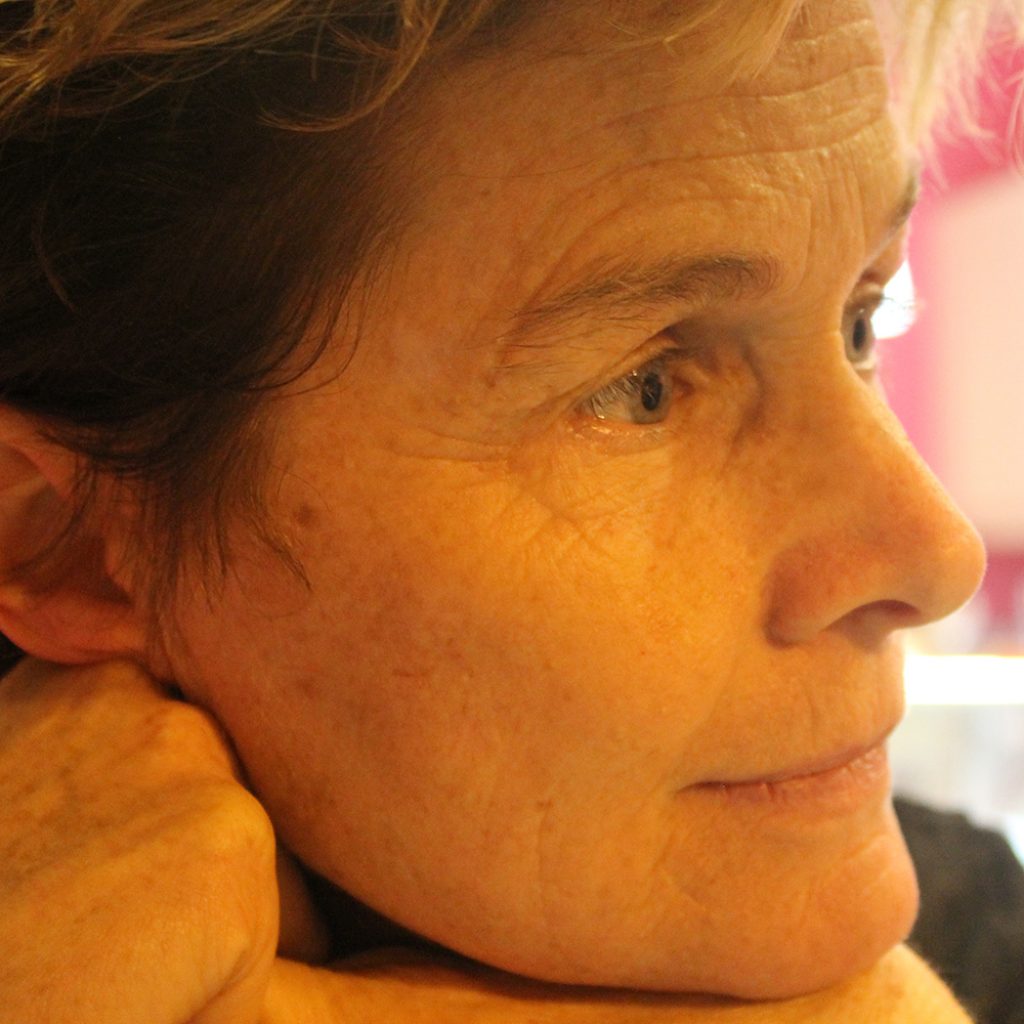
Isa Coffey | Chatham, NY
When Isa’s (she/her) COVID-19 symptoms reach their climax, she fears she may die alone and longs to connect with those she loves, but physical closeness is out of reach. As she fights for her life in solitude, she finds hope in the sound of Andrea Bocelli’s voice, as he sings by himself to the empty Duomo of Milan on Easter Sunday broadcast live worldwide.
Story Transcript:
Song, rising.
Ash Wednesday, a month before Easter, when early morning ashes of a dead Christ would be made into a silky cross on my young girls’ forehead and I’d go to school like that, wondering about death, about what happened after.
Good Friday, the night that marked the death of hope, of love, and of communion my family of 6, dressed plain, would go to Mass in the evening. It would be quiet, the only time the church was completely dark, and a million priests in floor-length dresses – and my father in his suit – would walk slowly up the length of the central aisle, church boys looking like angels in front of them, swinging incense and singing in latin.
Every Easter of my long childhood, that day of miraculous rising, song, and celebration, my mother would have made our Easter clothes, mine identical to my sister’s, two grey wool skirts, matching the grey wool shorts our brothers would wear.
*
Anyway, you don’t know this, but I have two sons.
One, 27, lives across the Hudson river from me.
The other, 19, lives in the city.
The 19 year old visited a week before my symptoms started,
visited just after Ash Wednesday,
visited me for my birthday,
visited just a few days before my eye started swelling up, so hot and purple it began filling the entire left
side of my face, left ear and lips included.
My holy 19 year old, who doesn’t yet know it, but who likely brought the virus right here to me, an unintentional gift for turning 61.
How can you tell your child this news?
Anyway, the older one met me in Hudson, at the Emergency Room at 1:30am, 3 weeks ago, right between Ash Wednesday and Good Friday.
We met in the dark ER parking lot, where a flimsy white plastic tent for COVID patients had been hastily erected, over there, by the back wall, where the orange cones and police tape set up around the collapsing tent had already blown over to the side, not keeping anyone out, or in.
My son met me, eye so swollen I couldn’t see really see him, and he stood outside my car, far away.
My eyes, the swollen and the not, already were weeping, the sudden and intense possibility of touch
pulling me into a current, into a sea of longing.
Weeping, afraid, and desirous, I invited him to climb into my back seat, this man who once was an egg inside my body, once was a child I nursed for 3 years, once was a kid I stayed up with, night after night, face mask holding albuterol to his lips.
Breathe.
Breathe.
Breathe,
our song for years of fearful nights, Brooklyn street lights the only thing bringing warmth.
My son, my firstborn, this man who lives fully in my lungs and heart, stood outside my car in the frigid night air, no hat, declining.
Then stood, silently waiting for my understanding.
It came slowly.
Honestly, it didn’t, lungs so filled with loneliness, sorrow, and coronavirus, I felt like I was drowning.
Anyway, two mornings ago, which also was Good Friday, my Covid-heavy body woke, already sobbing, lungs shocked by a kind of pain that was….inhuman.
This body, which birthed two sons, had gone through brain surgery, a broken leg, years of
endometriosis…this body had no scale by which to measure this pain.
Alone in my house, my dog the only one close enough to hear me cry, I wondered:
What happens to my body?
What happens to my corona-covered dog?
Anyway, I called my older son, the 27 year old, and begged him to come take me to the hospital.
Told him. I couldn’t. Do it.
Not alone.
He stayed on the phone.
He stayed on the phone,
present.
silent.
while I cried,
being buried within cell walls of this disease that causes
heartache.
*
The other thing about now, about right now, about the miracle of terrifying, unsteadying now is this:
There’s a woman.
Someone I want – deeply want – to press my hands into,
solid glass of her front door keeping her coronas – all of them,
including the virus – inside her warm dwelling,
and mine- all of them, including the virus – out.
Coronas, those luminous emergents,
rise up from the crown of the clitoris,
the nipples of our breasts,
the deep longing in our hearts.
and all of the planets.
and each of the stars.
I’m here, and it might be Holy Thursday, and I’m not Catholic,
and haven’t been for decades, and I’m standing outside the thick glass door, all my coronas luminous, alive with desire, the coronas of the covid virus so fully in my lungs and heart I can feel the heat, the weight of them.
How much I want the glass to melt from heat.
mine.
corona in my chest,
corona down between my legs,
warming slowly to fire.
Later, on Easter, when she texted, each of us too sick to rise from our couch and our bed, on our own sides of our shared river,
she –
mostly –
entirely really,
a stranger still,
bodies still unmet, she texted:
“Turn on Andrea Bocelli.
He’s singing now, in the Duomo.”
So I found Andrea Bocelli, world famous opera singer, and blind, and singing to…
no-one,
the great Cathedral of Milan completely empty but for the pianist and the slender singer.
Yet there he was – unseeing –
singing to all of us,
voice moving through airwaves and heart waves,
through coronas and the cosmos,
connecting lives,
connecting souls,
connecting the empty with the full.
I wept.
alone, in my home, except for my dog, both sons distant,
this woman within river passage, behind her thick glass door,
my friends with matzoh and with easter eggs,
distance and closeness,
– the solitude required –
the endless fear that’s
rising,
rising,
rising.
This one solitary, blind, extraordinary voice, singing hope.
